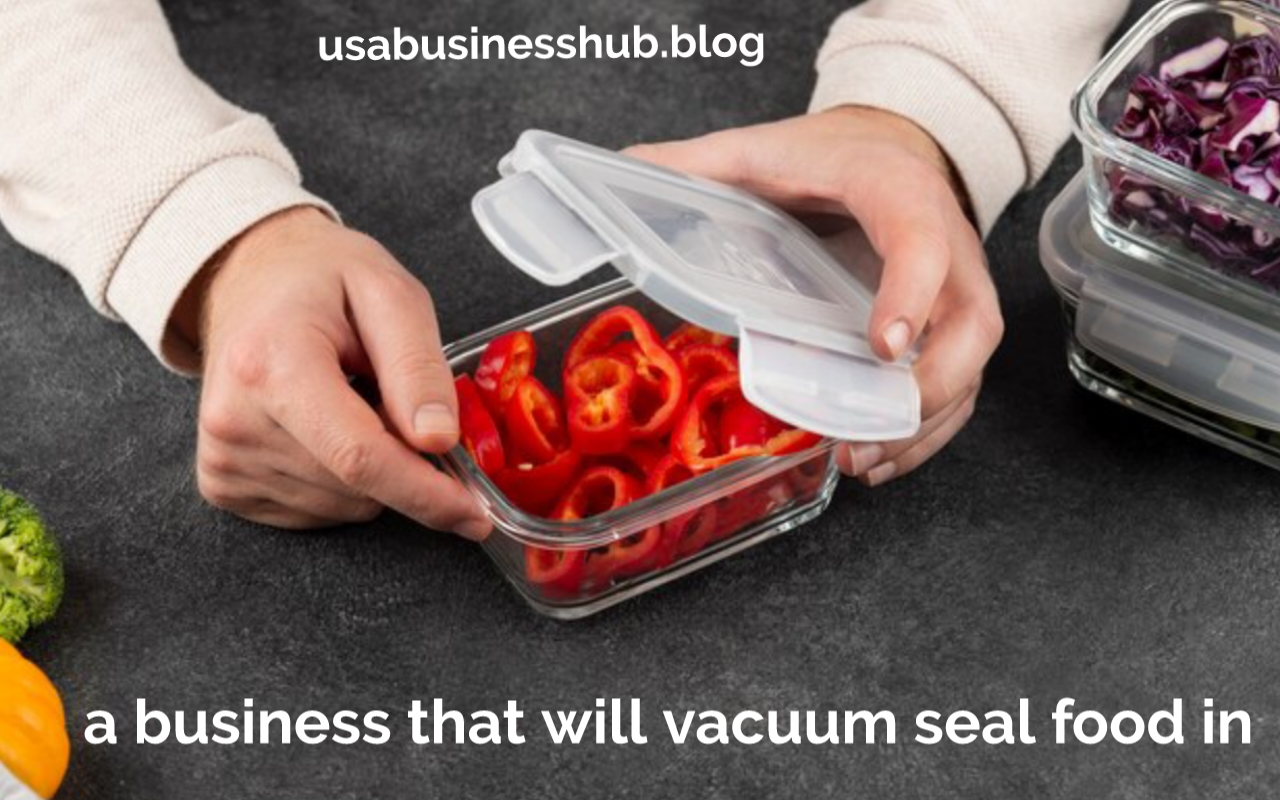Introduction
In today’s fast-paced world, finding ways to preserve food for longer periods is becoming increasingly important. Whether it’s for individuals trying to keep groceries fresh or restaurants looking to store ingredients efficiently, vacuum sealing has emerged as a reliable solution. Vacuum sealing food not only extends its shelf life but also helps retain its taste and nutritional value. Now, imagine starting a business that specializes in vacuum sealing food.
This could be your key to tapping into a growing market with endless opportunities. In this article, we’ll explore why starting a business that will vacuum seal food could be a smart move, the essential steps to get started, and how it can cater to various markets, from households to commercial industries.
Understanding Vacuum Sealing: What It Is and How It Works
Vacuum sealing is a food preservation technique that involves removing air from a specially designed plastic bag or container before sealing it. This process significantly slows down the growth of bacteria and fungi, both of which require oxygen to thrive. By creating an airtight environment, vacuum sealing prevents food from spoiling, losing its moisture, or developing freezer burn. Essentially, it locks in the food’s freshness and flavor for an extended period.
The process of vacuum sealing is quite straightforward. First, the food is placed in a vacuum-sealable bag or container. Then, a vacuum sealer machine extracts the air from the bag, which is subsequently sealed to ensure no air can re-enter. This method is widely used in both households and commercial settings to store everything from fresh vegetables to cooked meals and meats. The technology has evolved, and modern vacuum sealers are now more efficient and affordable, making them an attractive option for businesses.
Growing Demand for Vacuum-Sealed Food in the Market
Over the past few years, there has been a noticeable increase in the demand for vacuum-sealed food. This trend can be attributed to several factors. First, consumers are becoming more conscious of food waste and are seeking ways to reduce it. According to reports, the average family wastes about 30-40% of the food they purchase. Vacuum sealing addresses this issue by extending the shelf life of perishable items, enabling consumers to use food over a longer period.
Moreover, the rise of meal prep culture, where individuals prepare meals in bulk for the week, has fueled demand for vacuum-sealing solutions. Consumers appreciate the convenience that comes with being able to store prepared meals without worrying about them going bad. On the commercial side, restaurants and grocery stores are increasingly relying on vacuum sealing to maintain the freshness of their ingredients. For these reasons, launching a business that offers vacuum-sealing services is perfectly timed to meet the growing needs of modern consumers.
Benefits of Starting a Business That Will Vacuum Seal Food
So, why should you consider starting a business that specializes in vacuum-sealing food? The benefits are numerous. First and foremost, it is a business that addresses a fundamental consumer need—keeping food fresh. As food prices continue to rise, people are more inclined to seek out methods that help them save money. By offering a vacuum-sealing service, you provide them with a solution that allows them to extend the life of their groceries, meals, and even leftovers.
Furthermore, vacuum sealing is versatile. You can cater to various segments, such as individuals, families, restaurants, and even farms. It is a scalable business model with low startup costs compared to other food-related businesses. Additionally, vacuum sealing helps your customers save time and reduce food waste, making it a sustainable and environmentally friendly option. These factors combine to create a business opportunity that can thrive in a variety of markets.
The Science of Preserving Food Quality through Vacuum Sealing
One of the key advantages of vacuum sealing is its ability to preserve the quality of food. When food is exposed to air, it oxidizes, leading to the breakdown of fats, the browning of fruits, and the deterioration of nutrients. Vacuum sealing eliminates this oxidation process by removing air from the packaging. As a result, vacuum-sealed food retains its freshness, flavor, texture, and nutritional content much longer than food stored in regular packaging.
Let’s take the example of raw meat. Without vacuum sealing, meat stored in a refrigerator will start to spoil within a few days due to bacteria growth. However, vacuum-sealed meat can last up to two weeks in the fridge and several months in the freezer without losing its quality. The same principle applies to vegetables, which stay crisp and flavorful, and to cooked meals, which maintain their original taste and texture when reheated.
Why Consumers Are Opting for Vacuum-Sealed Food
Consumers are increasingly opting for vacuum-sealed food for several reasons. Firstly, it provides convenience. Vacuum-sealed meals can be stored in bulk, which is perfect for busy individuals who may not have time to cook every day. Additionally, vacuum sealing allows people to buy perishable items in larger quantities, often at a discount, without worrying about them spoiling quickly.
Another reason consumers prefer vacuum-sealed food is its health benefits. Since vacuum-sealed food retains more nutrients and flavor compared to other storage methods, it ensures that people are consuming higher-quality meals. In the restaurant industry, vacuum sealing is particularly valued because it guarantees that ingredients stay fresh, which is critical for maintaining the high standards that customers expect. In short, vacuum-sealed food is more than just about longer shelf life—it’s also about preserving quality and taste.
Types of Food Ideal for Vacuum Sealing
One of the great things about vacuum sealing is its versatility. A wide variety of foods can be vacuum-sealed, from raw ingredients to cooked meals. Here are some examples:
- Meat and Poultry: Vacuum-sealed meats can last several months in the freezer without developing freezer burn. This is ideal for people who like to buy in bulk or for restaurants that need to preserve large quantities of meat.
- Vegetables and Fruits: Fresh vegetables and fruits retain their crispness and nutrients when vacuum-sealed. Some vegetables may need to be blanched before sealing to stop enzyme activity, but they will last much longer than if stored traditionally.
- Dairy Products: Cheeses and other dairy items can also benefit from vacuum sealing, as it helps to prevent mold growth and extend shelf life.
- Cooked Meals: Prepared meals can be vacuum-sealed and stored for later use. This is great for meal preppers or families who want to cook in bulk.
- Nuts, Grains, and Dry Goods: Vacuum sealing can also help protect dry goods from becoming stale or being affected by pests.
How Vacuum-Sealing Services Can Cater to Multiple Markets
Starting a vacuum-sealing business opens up opportunities to cater to multiple markets. For example, you can target:
- Households: Many families are looking for ways to reduce food waste and make their groceries last longer. By offering vacuum-sealing services, you can help them store meals, snacks, and bulk food purchases more effectively.
- Restaurants: Chefs and restaurant owners need to ensure that their ingredients stay fresh and ready for use. Vacuum sealing allows them to preserve the quality of ingredients, reduce waste, and maintain consistency in their dishes.
- Farms and Grocery Stores: Farmers and grocery stores can benefit from vacuum sealing to package their produce and meat for sale. By offering vacuum-sealing services, you can partner with these businesses and provide them with a valuable tool for reducing spoilage.
- Meal Delivery Services: Companies that deliver pre-prepared meals can use vacuum sealing to ensure that their customers receive fresh, high-quality food.
By serving multiple markets, you can ensure that your vacuum-sealing business has a steady stream of clients.
Essential Equipment for Starting a Vacuum-Sealing Business
To start a vacuum-sealing business, you’ll need the right equipment. The basic tools include:
- Vacuum Sealers: There are various types of vacuum sealers, including external vacuum sealers and chamber vacuum sealers. Depending on your business needs, you may want to invest in commercial-grade machines for higher volumes.
- Vacuum-Sealable Bags and Rolls: These are specially designed to be airtight and durable. They come in various sizes to accommodate different types of food.
- Labeling Equipment: Properly labeling vacuum-sealed packages is essential to track expiration dates and provide customers with the information they need.
- Storage Facilities: If you plan to store vacuum-sealed food for customers, you’ll need adequate refrigeration and freezer space to ensure the food stays fresh.
Steps to Launch a Vacuum-Sealing Business
Starting a vacuum-sealing business involves several steps. Here’s a detailed guide:
Market Research and Planning: Before starting your business, it’s important to conduct thorough market research. Who are your potential customers? What are their needs? Look at what competitors are offering and identify any gaps in the market that your business could fill.
Licenses, Permits, and Health Regulations: Like any food-related business, you’ll need to comply with local health and safety regulations. This may include obtaining licenses and permits, ensuring your facility meets hygiene standards, and following food storage guidelines.
Marketing Strategies to Build a Customer Base: Once you’re ready to launch, you’ll need to build a customer base. Use social media to promote your business, offer discounts to attract first-time customers, and collaborate with local restaurants or grocery stores to get the word out.
Challenges to Overcome When Starting a Vacuum-Sealing Business
Starting any business comes with its challenges, and a vacuum-sealing service is no exception. You may need to educate customers on the benefits of vacuum-sealed food, especially if they are unfamiliar with the concept. Additionally, competition from other food preservation methods, such as freezing or canning, may require you to emphasize the unique advantages of vacuum sealing. However, with proper marketing and customer education, these challenges can be overcome.
Financial Benefits and Growth Potential in Vacuum-Sealing Businesses
A vacuum-sealing business has strong financial benefits and growth potential. Because the initial startup costs are relatively low (compared to other food-related businesses), you can achieve profitability fairly quickly. As demand for vacuum-sealed food continues to grow, you can expand your services to include delivery, meal prep, and bulk vacuum sealing for larger clients like farms and restaurants. With the right strategies in place, a vacuum-sealing business can grow steadily over time, offering both financial rewards and long-term success.
Conclusion
A business that specializes in vacuum sealing food is a great opportunity for aspiring entrepreneurs who want to offer a valuable service to their community. Whether you’re helping families reduce food waste, assisting restaurants in preserving ingredients, or partnering with farms to extend the shelf life of their produce, vacuum sealing is a versatile and profitable business model. As more consumers seek out ways to keep their food fresh, vacuum-sealing businesses will continue to thrive.
FAQs
- Is vacuum sealing safe for all types of food? Vacuum sealing is safe for most foods, but it’s important to follow best practices, especially with items like raw meats. Some foods, like soft cheeses and certain vegetables, may require special handling.
- How long does vacuum-sealed food last? Depending on the type of food, vacuum-sealed products can last from weeks to years. For example, vacuum-sealed meats can last up to two years in the freezer.
- What are the startup costs for a vacuum-sealing business? Startup costs can vary depending on the scale of your business. You’ll need to invest in vacuum sealers, bags, labeling tools, and possibly refrigeration if you’re storing food for clients.
- How do I attract customers to my vacuum-sealing business? Use marketing strategies like social media promotion, collaborations with local restaurants and farms, and offering discounts or trials to attract customers.
- Can vacuum-sealed food be frozen? Yes, vacuum-sealed food can be frozen, and it often lasts much longer than food stored using traditional methods.



